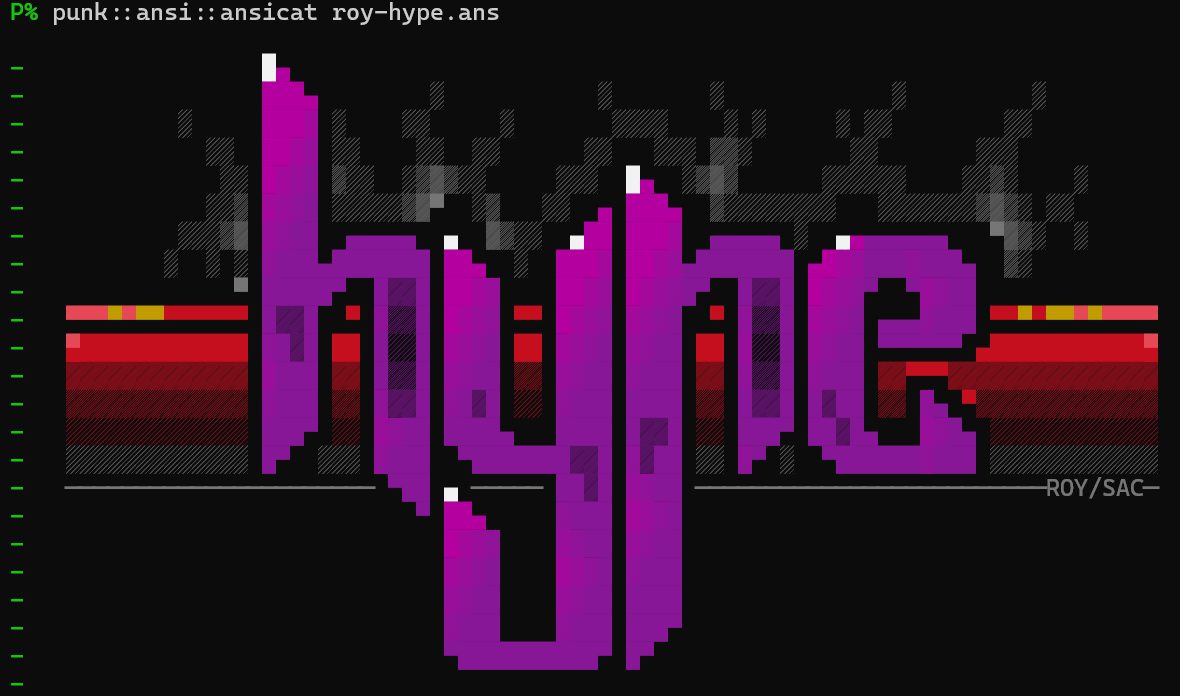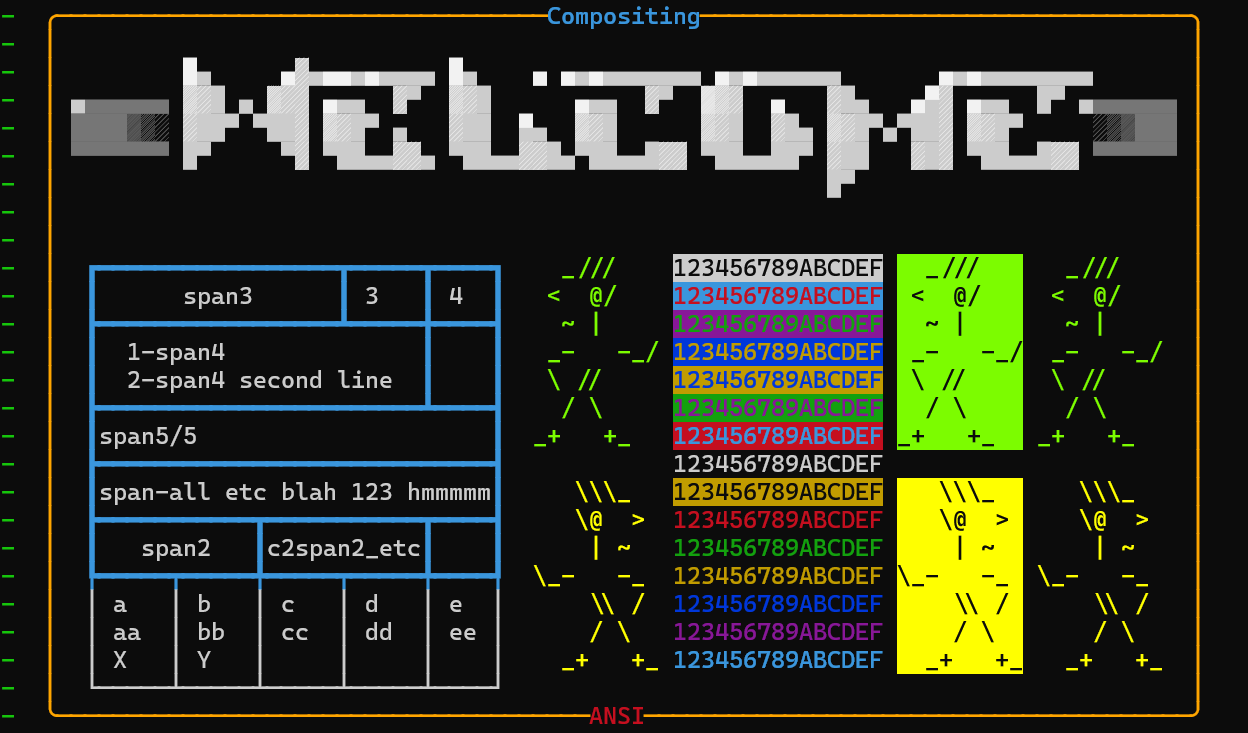|
|
7 days ago | |
|---|---|---|
| .fossil-custom | ||
| .fossil-settings | 6 months ago | |
| bin | 7 days ago | |
| callbacks | 12 months ago | |
| scriptlib | 5 months ago | |
| src | 7 days ago | |
| .gitignore | 1 week ago | |
| AGENTS.md | 4 weeks ago | |
| README.md | 7 months ago | |
| compositing_ansi.png | ||
| getpunk.cmd | 6 months ago | |
| getpunk.cmd.lastrun | 6 months ago | |
| getpunk.ps1 | 5 months ago | |
| hype_roysac.png | ||
| punk1.ico | ||
| punk1.png | ||
| punk1_transparent.png | ||
| punkproject.toml | 10 months ago | |
| tclint.toml | 5 months ago | |
README.md
punkshell - an alternative Tcl Shell
BSD license
2023-08 Note: this is alpha level software and still highly experimental.
Features
- default ansi color output - toggle with 'colour on' and 'colour off' (or set NO_COLOR environment variable)
- convenient and comprehensive in-terminal display of tk, web and terminal ANSI colour names and codes.
- rendering of old-school Ansi art (cp437) in the terminal

- Relatively easy compositing of text blocks containing Ansi colour codes - (or rendered versions of ansi containing movement and other controls)
proc welcome_test {} {
package require textblock
package require punk::ansi
package require overtype
set ansi [textblock::join -- " " [punk::ansi::ansicat src/testansi/publicdomain/roysac/roy-welc.ans 80x8]]
# Ansi art courtesy of Carsten Cumbrowski aka Roy/SAC - roysac.com
set table [[textblock::spantest] print]
set punks [a+ web-lawngreen][>punk . lhs][a]\n\n[a+ rgb#FFFF00][>punk . rhs][a]
set ipunks [overtype::renderspace -width [textblock::width $punks] [punk::ansi::enable_inverse]$punks]
set testblock [textblock::testblock -size 15 rainbow]
set contents $ansi\n[textblock::join -- " " $table " " $punks " " $testblock " " $ipunks " " $punks]
set framed [textblock::frame -type arc -title [a+ cyan]Compositing[a] -subtitle [a+ red]ANSI[a] -ansiborder [a+ web-orange] $contents]
}
-
experimental functional/pattern-matching language features. (will not be performant until more work is done on script compilation)
e.g.1 basic pipeline with 2 segments
var_pipe_output.= var_list.= list a b c |> string toupper
e.g.2 basic pattern-match multi-assignment to variables x y & z
x@0,y@1,z@2.= list a b cequivalently:x@,y@,z@.= list a b cor evenx@,y@,z@= {a b c}
x/0,y/1,z/2,zz/3.= list a b cis similar - but the use of forward-slash instead of @ will not produce a mismatch if an index is out of range.
where .= indicates following arguments form a command, and a plain = accepts only a single argument as a value
The diminutive case of this isx= "something"as equivalent toset x "something"
Assignment operations and pattern-matches are slightly optimised to bytecompile, but are unlikely to compete with raw Tcl commands performance-wise.
e.g.3 destructuring pattern-match. Get value of key 'k1' from last item in a list of dicts.
x@end/@@k1.= list {k1 aaa} {k1 bb}returns bbbThere are many more pattern-matching features yet to be documented.
-
easy execution of externals commands with return of stdout, stderr and the exitcode of the process
The run... commands use a very basic repl-telemetry system to output more information to the console than just the return value,
but in a way which makes the return value clear. The telemetry only outputs if the command is the first word on the commandline.run <comand> ...
(return exitcode of process - and allows process writes to stderr/stdout to appear in console as they occur)runout [-n] <command> ...
(return stdout of process - no output until completion)runerr [-n] <command> ...
(return stderr of process - no output until completion)runx [-n] <command> ...(return a dict of stdout stderr exitcode - no output until completion)
The run... commands attempt to make it clear if a called process outputs a trailing newline by displaying a trailing blank line.
The optional-nargument can be used to suppress a trailing newline.runout -n pwdis thus similar to Tcl'sexec pwd
For simple casesexec <command>is fine - but the equivalentrunout -n <command>when used in the shell will display exitcode and stderr separately (whilst returning only stdout) exec will return stdout and stderr together.
If you are on a unix-like platform, or a windows platform which has something like msys2 to provide commands like 'which' and 'grep' in the path:
Tryrunx -n which grep nonexistantvsexec which grep nonexistantto see the difference in terms of easy access to what was written to stderr vs stdout.
The run... commands are intended as a supplement for rather than a replacement for Tcl's exec/open. -
namespace browser (contextual - allowing running of commands within the active namespace - analogous to 'cd' for directories)
n/- display child namespaces of current namespace (alias:/)
alson/ <globpattern>to restrict outputn/ <childns>- if the argument doesn't contain glob chars '*' or '?' - attempt to switch to a child namespace of that name. Analogous tocd <dir>
list any sub namespaces of the namespace we just switched to.n//- display child namespaces and commands (alias://)
with colourised indication of type such as proc,alias,ensemble,oo object,oo class,imported,exported where possible.
(renamed aliases and builtins and commands loaded from binaries will appear unmarked)nn/- move up one namespace towards root namespace '::' analogous tocd ..(alias::/)n/new <somename>- create a child namespace called 'somename' and switch to it in one operation. (alias:/new)
-
cross-platform alternative to cd & ls/dir without invoking child processes. Display colourised listing of dirs and folders - with vfs indication.
d/- list current directory (alias./)
alsod/ <globpattern>to restrict outputd/ <subdir>- switch to subdir and list contents in one operationdd/- move up one directory and output listing. Roughly equivalent tocd ..followed by dir or ls (alias../)d/new <folder>- create a child directory and switch to it in one operation. (alias./new <folder>)
-
Ability to create zipfs wrapped applications with all required libraries built in.
-
Additional libraries
- improved fork of tcllib's imap4 (punk::imap4)
- netbox client library (punk::netbox)
- telnet client with support for cp437 e.g can render mapscii.me with mouse support, and can view the ANSI max-headroom movie at 1984.ws
- A feature-rich argument processor that can be used purely to generate function documentation, or also to process and validate flags and values (punk::args) The argument processor/documentor can display command synopses, grids of applicable argument choices, and indications of when short-forms (prefixes for flags/arguments/values) are applicable.
missing
- raw mode REPL (read-eval-print-loop) to allow commandline completion etc (undergoing development).
- documentation is incomplete.
- tests coverage is low.
- signal handling on unix-like platforms (ctrl-c implemented on windows only).
very unripe parts:
- commandline options - in need of work to document and lock down specifics - in particular: punkshell somescript.tcl needs a fix to emit errors.
- shellfilter - api is clumsy
- scriptlib - will likely be reorganised/pruned significantly
